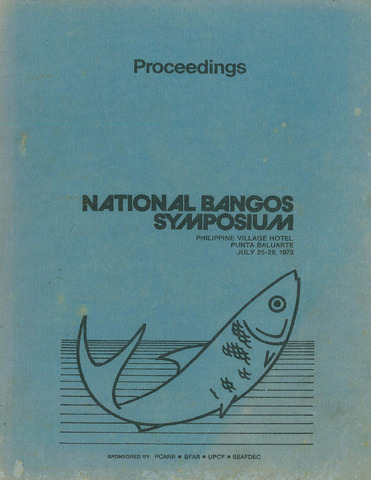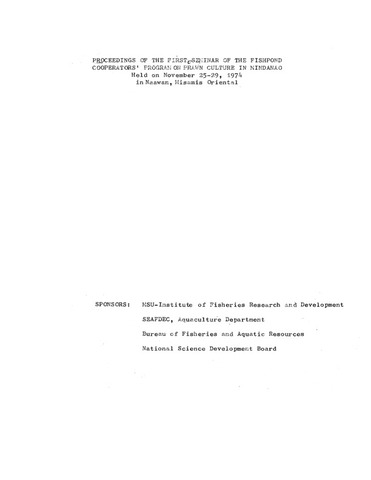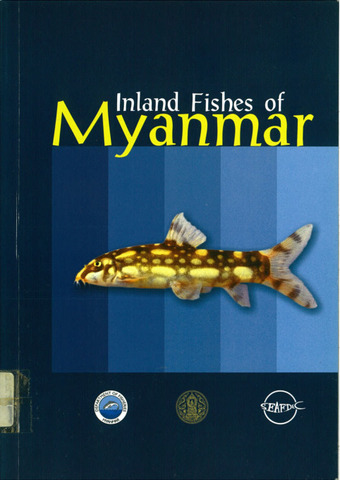Development and fisheries: SEAFDEC role and future direction of international collaborative activities
Share
| dc.contributor.author | Okamoto, Junichiro | |
| dc.contributor.editor | Miyata, Satoru | |
| dc.contributor.editor | Tada, Minoru | |
| dc.contributor.editor | Koyama, Osamu | |
| dc.coverage.spatial | Southeast Asia | en |
| dc.date.accessioned | 2023-10-24T08:32:38Z | |
| dc.date.available | 2023-10-24T08:32:38Z | |
| dc.date.issued | 2004 | |
| dc.identifier.citation | Okamoto, J. (2004). Development and fisheries: SEAFDEC role and future direction of international collaborative activities. In S. Miyata, M. Tada, & O. Koyama (Eds.), Prospects for Food Security and Agricultural Sustainability in Developing Regions: New Roles of International Collaborative Research (pp. 151–156). Japan International Research Center for Agricultural Sciences. | en |
| dc.identifier.uri | http://hdl.handle.net/20.500.12066/7410 | |
| dc.description.abstract | The Southeast Asian Fisheries Development Center (SEAFDEC) is an autonomous inter-governmental body established as a regional treaty organization on December 28, 1967, in accordance with an agreement concluded at the Second Ministerial Conference for Economic Development of Southeast Asia held in Manila, the Philippines in April 1967, to develop the fisheries potential of the region by rational utilization of the resources for providing food security to the people through the transfer of new technologies, research, and information dissemination activities. While SEAFDEC has been deeply involved in technical cooperation with member countries for fisheries development in the region since its establishment in 1967, it seems that the roles required of SEAFDEC by its member countries has changed. This is unsurprising, as the SEAFDEC membership now covers all ASEAN countries and Japan. SEAFDEC has put priority on fisheries development activities and related areas since 1967 as its major role, including the provision of a platform for South-South cooperation among member countries. However, recently, recognizing the importance of conservation and management of fisheries resources and environmental considerations in fisheries development throughout the region, SEAFDEC begins reviewing its policy to appropriately address the changes in the environment surrounding fisheries in the region, including cooperation not only within member countries but also with various relevant international organizations. Through various attempts to meet the requirements requested by the SEAFDEC regional policy in 1998 and the Plans of Action adopted at the ASEAN/SEAFDEC Millennium Conference in 2001, SEAFDEC has considered "Sustainability" a key word for the fisheries activities in the region and has implemented various prioritized programs focusing on sustainable fisheries in accordance with its guidelines for the "Plans of Action." The range of research related to SEAFDEC competence is quite wide, covering fishing technology, marine engineering, aquaculture technology, resource population dynamics, biology, food safety, and postharvest technology. For these research subjects, SEAFDEC can take advantage of its very unique organizational structure covering the four main sub-sectors of fisheries. It also provides an open laboratory function to implement research programs in the region. SEAFDEC understands that regional cooperation in fisheries-related research and technology transfer have become more important in light of international needs to achieve sustainability. The function of SEAFDEC could thus be more appropriate for other international organizations and associations to promote collaboration within Southeast Asia. | en |
| dc.language.iso | en | en |
| dc.publisher | Japan International Research Center for Agricultural Sciences | en |
| dc.relation.ispartofseries | JIRCAS International Symposium Series;No. 12 | |
| dc.relation.uri | https://www.jircas.go.jp/sites/default/files/publication/intlsymp/intlsymp-12_151-156.pdf | en |
| dc.subject | South East Asia | en |
| dc.title | Development and fisheries: SEAFDEC role and future direction of international collaborative activities | en |
| dc.type | Conference paper | en |
| dc.citation.spage | 151 | en |
| dc.citation.epage | 156 | en |
| dc.subject.asfa | fisheries development | en |
| dc.subject.asfa | international cooperation | en |
| dc.subject.asfa | natural resources | en |
| dc.subject.asfa | research | en |
| dc.subject.asfa | technology | en |
| dc.subject.asfa | fisheries | en |
| dc.subject.asfa | fishery institutions | en |
| dc.subject.asfa | fishery technology | en |
| dc.citation.conferenceTitle | Prospects for Food Security and Agricultural Sustainability in Developing Regions: New Roles of International Collaborative Research | en |
このアイテムのファイル
| ファイル | サイズ | フォーマット | 閲覧 |
|---|---|---|---|
|
このアイテムに関連するファイルは存在しません。 |
|||
このアイテムは次のコレクションに所属しています
-
Conference Proceedings [3]
These papers were contributed by Secretariat staff to various national and international Conferences



